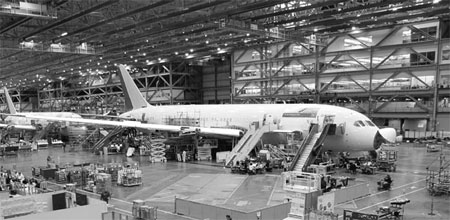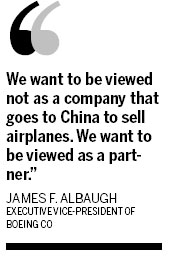| 
Boeing says its procurement from China is significantly greater than other aviation companies. It is Chinese aviation manufacturing industry's largest foreign customer. Li Xing / China Daily
SEATTLE - Top executives at Boeing Commercial Airplanes all have stories to tell about their first trips to China.
Nicole Piasecki, vice-president of business development and strategic integration at Boeing Commercial Airplanes, first traveled to China in 1985 during an exchange program. She remembers flying to Xi'an in an old Russian plane. The seats were not firmly secured.
"When we were taking off, our whole row went back," she recalled.
Now, China is a frequent destination because Boeing's strong relationship with China in the aviation sector.
The China office of US aircraft manufacturer Boeing Co said in late April that an expansion of its venture in North China's port city of Tianjin will be operational by 2013. The $21-million project will double the size of Boeing Tianjin Composites Co Ltd, a joint venture between Boeing and the China Aviation Industry Corp, which produces components for the Boeing 737, 747, 767, 777 and the 787 Dreamliner aircraft.
The expansion will increase the venture's production capacity by 60 percent by 2013 and add 300 jobs, bringing the venture's total employment to more than 1,000.
"I'd like to think we (Boeing and China) are partners," James F. Albaugh, executive vice-president of Boeing Co, said in an exclusive interview with China Daily in December. "We worked with China to develop its aviation industry, aviation infrastructure, and we continue to depend on them as they, I hope, depend on us."
Albaugh is confident in the China's potential for growth, despite competition from Airbus in Europe and China's effort to expand its high-speed railways and build its own aircraft.
"The prospects of China are very good," said Albaugh, who is also president and CEO of Boeing Commercial Airplanes.
During his first visit to China, he was told that China needed to buy 200 airplanes a year to keep up with demand and interest in traveling. But Albaugh disagrees. "In my view, there is going to be a lot more than that, close to 300," he said.
Albaugh said taking into account the number of airports China was going to build, as well as "the size of the population; the percentage of the population that is likely to fly but hasn't flown yet; the percentage of the population that now wants to fly for leisure, travel; the number of tourists and business people that are coming to China from other countries".
In a word, "I think the opportunities are huge," he said.

Randy Tinseth, vice-president of marketing for Boeing Commercial Airplanes, had more data to show how China is "the market moving forward".
He told China Daily he based his analysis not only on China's present development, but also on a 20-year forecast that his research team has produced every year since the 1950s. The data "allows us to take a fresh look at the market and incorporate the latest thinking and analysis of the market", Tinseth said
Having gone through the economic cycles and business challenges from nearly six decades, Tinseth said air travel still managed to grow about 5 percent a year. This is because of the strong link between air travel and the economy and people's curiosities and their need to travel, he said.
Today, Boeing has 31 customers in China flying about 870 Boeing airplanes. Moreover, Tinseth reckoned that about 190 million Chinese fly in Boeing airplanes. Last November, he announced in Beijing that his company projected that China would need 4,330 new commercial airplanes, valued at $480 billion, over the next 20 years.
In short, 20 years from now, more than 40 percent of all travel will begin and end within the Asia-Pacific market," Tinseth said, and China makes up about 40 percent of that demand.
"This is our idea of the important role that Asia as well as China will play," he said.
By 2030, China's passenger traffic will reach 1.5 billion, Tinseth said, quoting from Boeing's recent 20-year forecast.
Tinseth said he and his team are aware of China's ambitious plan to develop a high-speed rail system. Boeing sees it as both competition and complementing the travel sector.
His research team examined the high-speed rail development plan. They concluded that a high-speed rail system would attract a lot more passenger flow for cities within 800 km of each other.
Travelers are likely to debate between whether to ride or fly when cities are 800 to 1,200 km apart.
But they believe that most passengers would favor air travel if the distance goes beyond 1,200 km, as personal wealth grows and time becomes more important, Tinseth said.
Boeing's footprints in China go far beyond selling airplanes.
"There is not a plane we built that doesn't have parts from China in it," Albaugh said.
According to Boeing, its procurement from China is "significantly greater than other aviation companies. Boeing is China's aviation manufacturing industry's largest foreign customer."
"When you look at all our joint ventures in China, we employ about 6,000 people in total," Tinseth said.
Ray Conner, Boeing Commercial Airplanes' vice-president and general manager of its supply chain management and operations, made his first trip to China in 1988. He was part of the Boeing team to move the production of vertical fins to Xi'an.
Conner showed a map of China marked with dots of field service, technical support, training and flight simulators across the country. Its field service reaches as far west as Ali, Tibet autonomous region; Harbin, Heilongjiang province in the Northeast; and Haikou in the South. It also covers some second- or third-tier cities, such as Dunhuang in Gansu, Jiuzhaigou in Sichuan, and Linzhi (Nyingchi) in Tibet.
Apart from vertical fins manufactured in Xi'an, horizontal stabilizers are made in Shanghai and a joint venture in Tianjin produces interior component parts and nonmetallic composite work for airplanes, Conner said.
Chinese manufacturers in Shanghai, Xi'an, Tianjin as well as in Chengdu and Shenyang also contribute parts to Boeing's "next-generation" 737s, also called 787 Dreamliner, or 747-8s.
"I've watched our relationship grow" and China is "participating in every one of our airplanes today", Conner said, while his company has been "part of the fabric of the whole aviation industry in China".
Since 1993, Boeing has helped train more than 37,000 Chinese pilots, mechanics, engineers and other professionals in flight operations, maintenance, air traffic management, manufacturing, quality assurance, finance and industrial engineering, according to Boeing.
A model of a Cathay Pacific freighter stands by the door inside the office of Lou Mancini, senior vice-president in charge of commercial aviation services. An airplane piece is kept in a glass frame on a shelf on the other side of the door.
The piece was cut from a 747-400 Cathay Pacific airplane to create a cargo door when it was converted into a freighter in 2005.
It was the first conversion job done by Taeco-Taikoo (Xiamen) Aircraft Engineering Co Ltd, a joint venture in Xiamen in airplane repair, maintenance, part manufacturing, component service and conversion, with Boeing holding 9.1 percent of the shares.
The piece was cut out on April 28, 2005, and since then, Taeco has finished between 35 to 40 new 747-400 Boeing converted freighters, Mancini said.
A computer monitor in Mancini's office, which is linked to its operations center, maintains almost real-time watch over the 1,500 Boeing airplanes while they are flying. It's a "fancy prognostic forecasting system, so you can monitor your airplane and figure out what maintenance it is going to need in a next couple or three days," Mancini said.
Around the world, 40 customers, including Air China, use the tracking service, available 24 hours a day, seven days a week.
"You know exactly the status of an airplane in 20 seconds," Mancini said. "I can log on at home with my iPad and watch airplanes flying."
In terms of pilot training, Boeing is moving a 787 flight simulator to Shanghai, to join five 767 simulators already in place, Mancini said.
Boeing is also involved in air traffic management in China. Before the Beijing Olympics, it worked with Beijing Capital International Airport to optimize the airspace around the airport to increase capacity.
Mancini highlighted Boeing service teams now spread across China. With the required navigation performance technology, Boeing has worked with Chinese airlines to fly into Nyingchi, Tibet, in between the mountains on the roof of the world.
"We are very interested in air traffic management, and we would like to help China out," he said.
As Chinese airlines fly more Boeing aircrafts, its services will also grow in China.
"We are global but local," Mancini said. "I cannot imagine supporting the world without being local."
Despite a Mandarin table at the operations center, Mancini said Boeing will build a satellite facility in Beijing and have it up and running around June. It will also be connected with the computer systems at the main operation center and all the telecommunication systems in the US.
"It will allow us to better understand China's market and its growing needs," Mancini said.
He said Boeing is likely to employ more local people who understand the local culture.
"I will never be able to understand Chinese culture. Why don't I get more people on the team?" he said.
Mancini said, "you have an extremely expanding market, and we want to be part of it obviously. So we think we'd better be very close to you, geographically and culturally so that we are providing such good support that you want to be on our team".
Piasecki highlighted China's need to invest in training young pilots who do not have enough hours, such as former air force pilots.
Technology upgrade is also a far cry in the growing aviation industry.
"The 787 Dreamliner has so much technology on it that it is a completely new generation in aviation that no one has seen before," she said.
"We want to be viewed not as a company that goes to China to sell airplanes. We want to be viewed as a partner. A partner that not only sells airplanes, but buys parts of airplanes there, contributing to the infrastructure, to the future of aviation industry," Albaugh said.
China Daily |

